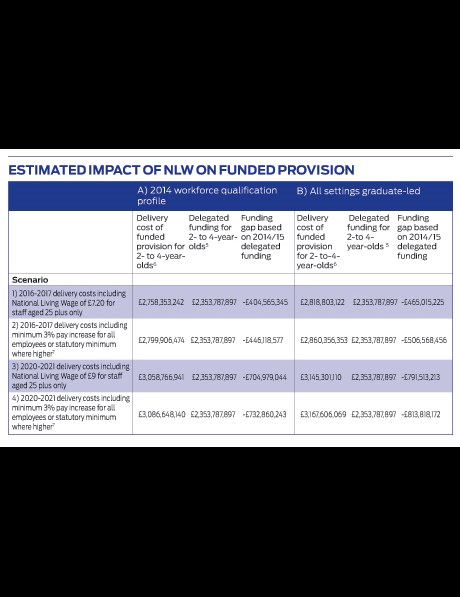Stress and mental health problems taking their toll on early years staff
Friday, June 1, 2018
One in four early years workers are considering leaving the sector due to stress and mental health problems, a major survey has revealed.

- 74 per cent per cent of respondents have been regularly stressed as a result of their job in the past month
- 57 per cent of practitioners say they have suffered from anxiety and 26 per cent from depression
- Funding (56 per cent) and low pay (54 per cent) are regular sources of stress
- 25 per cent are thinking about leaving the sector, while a further 5 per cent have already left, or are leaving
The report, Minds Matter, by the Pre-school Learning Alliance reveals the extent to which stress, anxiety and depression are becoming rife among nursery workers and childminders.
More than half (57 per cent) of the early years workforce has suffered from anxiety as a result of work, while a quarter (26 per cent) have experienced depression, the survey findings suggest.
High workloads, in particular paperwork and administration, financial pressures from a lack of Government funding, and low pay, are the main sources of stress cited by respondents.
Just under half of those surveyed (45 per cent) said work-related stress and mental health issues have impacted on their work performance.
Just under a quarter of respondents (23 per cent) have taken time off work for as a result of work-related stress or mental health issues. Practitioners are also suffering physical symptoms, including high blood pressure, palpitations, and in a small number of cases, heart attacks and strokes. Forty-five respondents (2 per cent) have experienced suicidal thoughts.
Only just over half of respondents (52 per cent) said they had spoken to someone at work about their stress or mental health issues.
The Pre-school Learning Alliance said that the survey results 'paint an incredibly concerning picture of the future of the early years sector', and warns that losing a significant proportion of the workforce would create serious challenges for the Government’s 30 hours childcare policy.
The early years organisation is now calling on the Department for Education and Ofsted to work with them to carry out a review into early years workloads to address excessive paperwork and administration.
While more research has been undertaken about the pressures of the job on primary and secondary teachers’ mental health, the Pre-school Learning Alliance survey seeks to fill the gap by providing a comprehensive overview of the impact of working in the early years sector.
The online survey received 2,039 responses and was carried out between 23 April and 18 May. Its release coincides with the Alliance’s annual conference in London (1 June), which this year focuses on the importance of protecting mental health for all in the early years, both children and practitioners.
Alistair Campbell, former Labour director of communications and strategy, and a mental health campaigner who has spoken openly about his own struggles with depression, will be giving the keynote speech at today’s conference.
Most of the survey respondents worked in nurseries (27 per cent), pre-schools (43 per cent), or as childminders (15 per cent).
Chief executive Neil Leitch said, ‘This survey serves as stark confirmation of the appalling impact that excessive workloads and severe financial pressures are having on the mental health of the early years workforce in England.
‘It’s clear from these results that years of ill-thought-out policies, inadequate funding and ever-increasing demands on the sector have taken their toll, and it is frankly shameful that we have reached this point. While over recent years, there has been at least some focus on the workload concerns of the primary and secondary education sectors, the struggles of those working in the early years have been largely ignored – and this is the result.
‘When you get to a situation where a quarter of your workforce is actively considering quitting, it’s clear something needs to change. Those that work in the early years do what they do because they are committed to helping young children learn and develop, but when working in the sector is affecting their mental – and physical – health, impacting on their ability to do their jobs properly and, in some cases, costing them their relationships, it’s hard to blame those that decide: “Enough is enough”.’

Source: Minds Matter, Pre-school Learning Alliance, June 2018
Why are early years workers stressed?
Three-quarters of practitioners (76 per cent) cited paperwork and administration as regular sources of stress. Many reported that they felt a lot of the paperwork was unnecessary, but felt they had no choice because they feared inspections by Ofsted.
One said, ‘I get frustrated with all the paperwork. Some of it is overload and some essential…but it’s an uneven balance in the wrong direction. Ofsted scares us too much!’
Others commented on an increasingly paperwork-led approach to assessing child development.
One said, ‘Early years has become about making [children] fit a criteria [sic] - no consideration is given to the speed the children learn at the moment. Everything is now about ticking the right box.’
Recent changes to the childcare funding system were also a problem, with both the 30 hours and Tax-Free Childcare quoted as sources of administrative stress. One respondent reported that the setting’s deputy manager spends around a quarter of her time dealing with funding and fee queries, and another quarter helping parents to access Tax-Free Childcare and funded hours.
Financial pressures
More than half of respondents (56 per cent) blamed financial pressures for their stress. Lack of Government funding is affecting staff morale, leading to ‘disillusioned and depleted’ staff, one respondent said.
Cuts to funding for children with special educational needs and disabilities is also impacting on practitioners’ ability to provide high-quality care.
Reduced funding for training staff was also mentioned in the survey, which in turn has financial implications for settings.
Pay
Low pay was a common concern and a regular source of stress for more than half of respondents (54 per cent).
One said, ‘I feel the sector is largely ignored, with poor pay and conditions, which leads to a workforce that is disgruntled and frustrated.’
Many practitioners also take work home with them. One said, ‘I dread to think what my hourly rate is if I divided my daily average income by the 10 hours I work a day and then add on extra hours for paperwork and training.’
Not surprisingly, most practitioners feel that they do not have a good work-life balance, with 65 per cent saying that work-related stress or mental health difficulties have impacted on their personal relationships.
Comments from the Minds Matter survey (all anonymous)
- ‘I feel burned out to the point that I’m now considering a career break.’
- ‘Working in early years used to be all about the children. Now it is all about the paperwork and constant changes to legislation ... There just aren't enough hours in the day and not enough money in the pot to pay people what they deserve for the job they do.’
- ‘I do not think I have the energy to continue in the sector for much longer.’
- “I know I cannot keep this pace up as it's not fair on me or my family.’
- ‘I wasn’t able to take the needed time off work when my father was dying, [I] haven’t been able to grieve for him properly because of work.’
- ‘I have loved this work but I have continually updated my skills and qualifications and I still receive little more than the minimum wage. Sadly it is now time to take on a new career to ensure I am able to retire with some liveable pension.’
Other speakers at today's conference include Ofsted chief executive Amanda Spielman, senior lecturer in early childhood education Dr Guy Roberts-Holmes, and Alliance chief executive Neil Leitch.











